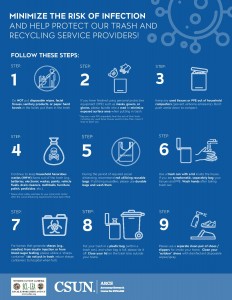CSUN ARCS Partners with SCL-LEA to Expand Community Health and Safety Awareness Across Los Angeles

Infographic developed by ARCS students and faculty in partnership with SCL-LEA. Photo courtesy of Prof. Ho
In an effort to minimize the risk of infection and help protect solid waste and recycling service providers and members of the community, California State University, Northridge ARCS (Autonomy Research Center for STEAHM) program has partnered with the Sunshine Canyon Landfill Law Enforcement Agency (SCL-LEA) to help circulate an important message of safety amid the COVID-19 crisis.
Using tips and messages provided by the Los Angeles County/City Local Enforcement Agency, of which the Sunshine Canyon Landfill Law Enforcement Agency (SCL-LEA) is a part, ARCS students developed infographics for the messages and helped launch a campaign on how to best circulate the message across Los Angeles.
The campaign has circulated across social and digital media and has been published in MSW Management, the official journal of the Solid Waste Association of North America (SWANA), the largest professional organization of solid waste management professionals in the world.
“Amid the current COVID-19 crisis, the partnership brings together two programs to create nine steps for better protection, generating awareness for the public,” said CSUN engineering professor Nhut Ho, director of the ARCS.
David Thompson, program manager for the City of Los Angeles (SCL-LEA) said the solid waste industry has “really stepped up” their efforts recently to keep the community safe and healthy during the COVID-19 emergency.
“I believe that if everyone can take these simple precautions, it will go a long way in protecting the people around us and the dedicated employees in the solid waste industry,” Thompson said.
The nine steps for better protection include:
- Do NOT put disposable wipes, facial tissues, sanitary products, or paper hand towels in the toilet, put them in the trash.
- If you have finished using personal protective equipment (PPE) such as masks, gowns, or gloves, please bundle into a wad to minimize exposed surface area when putting in trash.
- Keep any used tissues or PPE out of household compactors (prevent airborne emissions). Don’t push waste down to compact.
- Continue to keep household hazardous wastes (HHW) items out of the trash
- Recommending not utilizing reusable bags. If utilizing reusables, please use durable bags and wash them.
- Use a trash can with a lid inside the house. If you are symptomatic, separately bag your tissues and PPE. Wash hands after taking trash out.
- For homes that generate sharps (e.g., needles) from insulin injection or from blood sugar testing, please utilize a “sharps container”
- Put your trash in a plastic bag (within a trash can), and when the bag is full, please tie it off. Close your lid on the trash bins outside your home.
- Please use a separate clean pair of shoes/slippers for inside your home. Clean your “outdoor” shoes with disinfectant disposable wipes/spray.
Thompson said that this collaboration has been beneficial to both partners, adding that his organization was able to produce a “valuable public service announcement on COVID-19 and home trash disposal that had not previously been addressed.”
“This collaboration was able to bring together the strengths of each partner to help the community while giving valuable experience to the CSUN students,” Thompson said. “Without the contribution of ARCS faculty and students, this project would never have been completed.”
Ho said ARCS and SCL-LEA officials have discussed several ideas about bringing multi-disciplinary and convergence autonomy research to bear on challenges in the waste management arenas. He said, the partnership with SCL-LEA will benefit the students working on the projects.
“Our mission is to cultivate leaders,” Ho said. “By joining together with SCL LEA, we are not only making a difference but teaching our students that our choices define us. We have a group of talented students and faculty and have the ability to save lives. Our program is bigger than just projects, it’s about projects to help humanity.”
The Autonomy Research Center for STEAHM (ARCS) is a NASA-launched university center of excellence at CSUN. Combining the talents of faculty and students from 6 CSUN colleges, ARCS’ vision is to be a global leader in education, research and commercialization regarding Increasingly Autonomous (IA) systems. For more information on ARCS, visit https://arcs.center/

 experience
experience